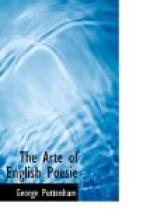being allowed one time, either short or long, it fell
out that euery tetrasillable had foure times,
euery trissillable three, and the bissillable
two by which obseruation euery word, not vnder that
sise, as he ranne or stood in a verse, was called by
them a foote of such and so many times, namely the
bissillable was either of two long times as
the spondeus, or two short, as the pirchius,
or of a long & a short as the trocheus, or
of a short and a long as the iambus: the
like rule did they set vpon the word trissillable,
calling him a foote of three times: as the dactilus
of a long and two short: the mollossus
of three long, the tribracchus of three short,
the amphibracchus of two long and a short,
the amphimacer of two short and a long.
The word of foure sillables they called a foote of
foure times, some or all of them, either long or short:
and yet not so content they mounted higher, and because
their wordes serued well thereto, they made feete of
sixe times: but this proceeded more of curiositie,
then otherwise: for whatsoeuer foote passe the
trissillable is compounded of his inferiour
as euery number Arithmeticall aboue three, is compounded
of the inferiour numbers as twise two make foure,
but the three is made of one number, videl. of two
and an vnitie. Now because our naturall & primitiue
language of the Saxon English, beares not any
wordes (at least very few) of moe sillables then one
(for whatsoeuer we see exceede, commeth to vs by the
alterations of our language growen vpon many conquestes
and otherwise) there could be no such obseruation
of times in the sound of our wordes, & for that cause
we could not haue the feete which the Greeks and Latines
haue in their meetres: but of this stirre & motion
of their deuised feete, nothing can better shew the
qualitie then these runners at common games, who setting
forth from the first goale, one giueth the start speedely
& perhaps before he come half way to th’other
goale, decayeth his pace, as a man weary & fainting:
another is slow at the start, but by amending his pace
keepes euen with his fellow or perchance gets before
him: another one while gets ground, another while
loseth it again, either in the beginning, or middle
of his race, and so proceedes vnegally sometimes swift
somtimes slow as his breath or forces serue him:
another sort there be that plod on, & will neuer change
their pace, whether they win or lose the game:
in this maner doth the Greeke dactilus begin
slowly and keepe on swifter till th’end, for
his race being deuided into three parts, he spends
one, & that is the first slowly, the other twaine
swiftly: the anapestus his two first parts
swiftly, his last slowly: the Molossus
spends all three parts of his race slowly and egally
Bacchius his first part swiftly, & two last
parts slowly. The tribrachus all his three
parts swiftly: the antibacchius his two




